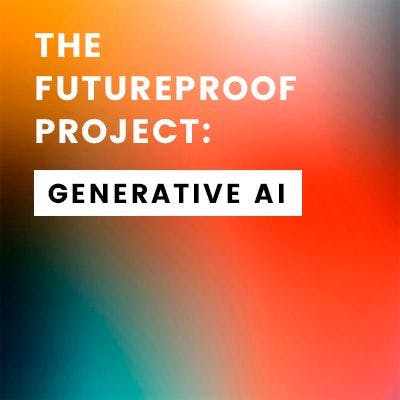The Futureproof Project: An AI Framework to Achieve “Holy cow, that's amazing!"

By Adam Kleinberg
Last week, we had the pleasure of sitting down with the newest member of Traction’s liquid workforce, Steve Pratt, co-founder of Noodle.ai and Infosys Consulting and a two-time “Top 25 Consultants in the World” honoree. He led us through an engaging and insightful conversation as part of our Futureproof Project event, "Getting to 'Holy Cow That's Amazing!' with AI." Steve shared his wealth of knowledge and experience on the rapidly evolving AI landscape and how it's transforming the world of marketing. We also introduced our framework for AI Adoption strategy. Let's dive into some of the key takeaways and explore how you can harness the power of AI in your own marketing efforts.
The critical need for a framework for AI strategy
Steve emphasized the importance of developing frameworks for AI adoption within your organization. When he was at Deloitte, he developed their Enterprise Value Map and has been working with the team at Traction on our own framework for rapid and responsible AI Adoption, Traction AI Value Navigator. AI is a strategic tool for marketers to gain a competitive edge. According to Steve, "AI can help reduce waste, improve profitability, and enhance customer satisfaction by making data-driven decisions." He shared a cool example from Noodle.ai, where they optimized inventory distribution for a billion-dollar brand, showing just how much of an impact AI integration can have.
Balance caution with enthusiasm in AI Adoption
It turns out that only about half of brand leaders feel prepared to explore and implement AI effectively. Steve stressed, "Developing good algorithms is hard, but making them work seamlessly in production is even harder. AI adoption is a journey requiring both technology and cultural shifts." Organizations need to be patient and pragmatic, as AI is only 20% of the work, with the remaining 80% involving software engineering, process changes, training, and integration.
Optimize marketing efforts with AI
Steve walked us through how AI is being used to optimize marketing efforts, from customer interaction to supply chain decisions and demand forecasting. He shared a success story where Noodle.ai improved demand forecasting accuracy by 12.6% in just three weeks for a large beverage company. He also highlighted AI's potential in brand marketing and customer engagement, saying, "AI can assist with content personalization, channel selection, and audience targeting, allowing marketers to tailor their strategies more effectively."
Lessons learned deploying AI in the real-world
Deploying AI comes with its own set of challenges, especially when it comes to integrating it into existing operations without breaking the bank. Steve shared some valuable lessons from Noodle.ai's journey, emphasizing the importance of robust software engineering, data quality, and managing compute costs. "We learned that the success of AI projects hinges on balancing technological feasibility, economic viability, and operational stability," he cautioned. Thorough planning and cost-benefit analysis are key before diving into AI solutions.
Graph data: The key to marketing personalization
Steve introduced the concept of graph data, suggesting that numeric graph data might be more impactful for enterprises than text or vision-based data. He envisions generative AI as a tool for mass personalization, campaign management, and content creation in marketing. He also explained how generative AI could revolutionize supply chain management by modeling it as a graph, enabling comprehensive optimization of inventory distribution and other complex decisions.
Garbage-in, Garbage-out: Why data integrity matters
Steve didn't mince words when it came to the importance of data integrity for effective AI implementation. He warned against "garbage-in, garbage-out" scenarios and advised organizations to ensure their data is accurate and clean to avoid erroneous AI outputs. "Systems must be designed to detect and handle bad data, as even ERP systems can contain rogue entries that disrupt operations," he elaborated. Comprehensive data management strategies are a must for successful AI integration.
The critical importance of AI governance
For decentralized organizations, Steve highlighted the need for AI governance. He recommends a federated approach that balances centralized oversight with the autonomy of different units. He suggested establishing a governance structure that defines roles for exploration, experimentation, and knowledge sharing. "It's important to avoid repeating past mistakes, such as centralizing all computing or allowing chaotic decentralization," he warned.
Partner with AI vendors, but wisely
Steve cautioned against underused "shelfware" and advised organizations to be strategic in their partnerships with AI vendors. He emphasized the importance of ensuring tools deliver real value, stating, "I would be fast to fire vendors that don't deliver." He also recommended avoiding long-term contracts and continuously scanning the horizon for new tools. His advice? Conduct thorough reference checks and ask critical questions about security compliance and multi-tenancy to assess vendor maturity.
Our conversation with Steve shed light on the transformative potential of AI. By developing an AI adoption framework that emphasizes both urgency and responsibility, navigating the readiness journey, and harnessing AI's capabilities in practical scenarios, marketers can unlock new opportunities and gain a competitive edge. As AI continues to evolve at a rapid pace, it's crucial for marketers to stay curious, informed, and strategic in their adoption and management of AI tools. With the right approach and mindset, you can embrace the power of AI to drive innovation, improve profitability, and enhance customer experiences in the ever-changing marketing landscape. Are you ready to take your marketing to the next level with AI? If you’d like to learn more about how Traction AI Value Navigator can help you on your AI adoption journey, or review case studies of how we’re helping other brands with theirs, drop us a line.
Key Takeaways
Implement a Strategic Framework: Utilize the Traction AI Value Navigator framework to guide rapid and responsible AI adoption strategy, emphasizing data-driven decisions that reduce waste, improve profitability, and enhance customer satisfaction.
Acknowledge the 80/20 Rule in AI Integration: Successful AI adoption is a journey where only 20% involves developing algorithms; the remaining 80% requires complex software engineering, necessary process changes, training, and integration into existing systems.
Prioritize Data Integrity and Governance: Establish robust AI governance (ideally using a federated approach) and guarantee strict data integrity to avoid "garbage-in, garbage-out" scenarios and ensure operational stability, especially within decentralized organizations.
Leverage Graph Data for Personalization: Focus on utilizing numeric graph data for maximum enterprise impact, enabling advances in mass personalization, optimizing marketing content creation, and revolutionizing complex supply chain management decisions.
Frequently Asked Questions (FAQs) About AI Adoption Strategy
Q1: What is the Traction AI Value Navigator framework and how does it benefit marketing strategy?
A1: The Traction AI Value Navigator is a proprietary framework developed for rapid and responsible AI Adoption strategy. Its purpose is to guide marketers in using AI as a strategic tool to gain a competitive edge. By facilitating data-driven decisions, the framework helps organizations reduce waste, improve profitability, and enhance customer satisfaction.
Q2: What are the primary challenges in deploying AI, and what is the 80/20 rule of AI adoption?
A2: Deploying AI comes with significant challenges related to integrating technology into existing operations. According to experts, developing algorithms is only about 20% of the work. The remaining 80% involves crucial tasks like software engineering, extensive process changes, employee training, and seamless integration into production environments. Success hinges on balancing technological feasibility, operational stability, and economic viability.
Q3: How is graph data leveraged to achieve mass personalization and supply chain optimization?
A3: The concept of numeric graph data is highly impactful for enterprises, even potentially more so than text or vision-based data. Generative AI can utilize this graph data to enable advances in mass personalization, content creation, and campaign management in marketing. Furthermore, generative AI can revolutionize complex supply chain management decisions—such as inventory distribution—by modeling the supply chain as a graph for comprehensive optimization.
Q4: Why are data integrity and governance critical for decentralized organizations adopting AI?
A4: Data integrity is essential because AI outputs are reliant on input quality, adhering to the "garbage-in, garbage-out" principle. Organizations must design systems to detect and handle bad data that might otherwise disrupt operations. For decentralized organizations, a federated approach to AI governance is recommended. This structure is vital for balancing centralized oversight with the autonomy of different business units, preventing chaotic decentralization, and ensuring crucial knowledge sharing.

The Futureproof Project's "Driving Growth with AI" event in New York was honored to have Cezanne Huq, VP of Growth at HelloFresh join us as our special guest.

UPDATE: WE WON! Traction was named the Campaign US Agency of the Year in the Talent Management category.

Our latest Futureproof Project event in San Francisco, "Savvy Marketing in the AI Era," was a profound exploration of how AI reshapes our understanding of marketing, innovation, and societal norms. I had the honor of sitting down with Shiv Singh, a vanguard in the intersection of marketing and digital innovation.
